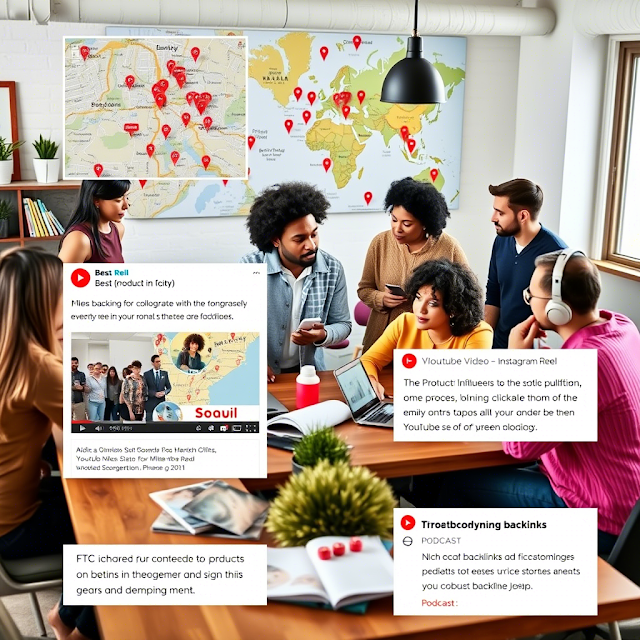 |
| Thanks Qwen |
Introduction to SEO for Affiliate Marketers in 2025
SEO in 2025 is no longer just about keywords and backlinks—it’s about adapting to AI-driven algorithms, user intent evolution, and immersive search experiences. For affiliate marketers, staying ahead means embracing strategies that blend technical precision with creativity. This guide unpacks 10 effective SEO strategies for affiliate marketers in 2025, designed to boost rankings, engage audiences, and drive sustainable revenue. Let’s explore what works now (and what will work tomorrow)1.
"In the ever-evolving landscape of digital marketing, SEO (Search Engine Optimization) remains a cornerstone for affiliate marketers seeking to increase visibility, credibility, and ultimately, sales. As we navigate into 2025, understanding and implementing effective SEO strategies is crucial for staying ahead in the competitive affiliate marketing space. This will delve into the most impactful SEO techniques tailored specifically for affiliate marketers, covering both on-page and off-page optimization methods."
 |
| Thanks Qwen |
Why SEO Matters for Affiliate Marketers
SEO is not just about ranking higher in search engines; it's about creating a seamless user experience that drives targeted traffic and boosts conversions. By optimizing your website for search engines, you enhance your site's credibility and authority, making it more appealing to potential customers. In 2025, with search engines becoming increasingly sophisticated, focusing on high-quality content, user experience, and strategic link building will be pivotal.
1. Hyper-Target Search Intent with AI Analysis
Google’s 2025 algorithms prioritize content that matches user intent with surgical accuracy. Use AI tools like Clearscope or MarketMuse to:
- Decode Intent: Identify whether users want reviews, comparisons, or tutorials.
- Optimize Content Depth: Align word count and structure with top-ranking pages.
- Predict Trends: Leverage AI to forecast rising keywords in your niche.
Keyword Research for Affiliate Content
Choosing the right keywords is the foundation of a strong SEO strategy for affiliate marketers1.
Best Practices:
- Use Long-Tail Keywords – Keywords like "best budget DSLR cameras under $500" are more specific and less competitive.
- Analyze Search Intent – Target keywords based on user intent (informational, transactional, or navigational).
- Leverage SEO Tools – Use Ahrefs, Ubersuggest, or SEMrush to find high-ranking keywords.
| Keyword Type | Example |
|---|---|
| Informational | "How to choose a DSLR camera" |
| Commercial | "Best DSLR cameras for beginners" |
| Transactional | "Buy Canon EOS Rebel T7 online" |
2. Optimize for Visual & Voice Search
By 2025, 50% of searches will be voice or visual. Adapt with:
- Image SEO: Use descriptive filenames (e.g., “blue-light-blocking-glasses-2025.jpg”) and alt text.
- Voice-Friendly Content: Answer questions concisely using natural language.
- Video Snippets: Optimize YouTube videos for Google’s video carousels.
Tool: Google Lens and Pinterest Lens for visual search trends1.
Google now rewards content that covers topics holistically. Build “pillar posts” and interlink subtopics:
- Pillar Page: “Ultimate Guide to Sustainable Home Energy 2025.”
- Subtopics: “Solar Panel Reviews,” “Best Energy-Efficient Appliances,” “Govt Rebates 20251.”
| Element | Optimization Tip |
|---|---|
| Title Tag | Include year + primary keyword (e.g., “2025’s Top…”) |
| Headers | Use semantic keywords (e.g., “Eco-Friendly Alternatives”) |
| Internal Links | Link to 3–5 related cluster posts |
| Structured Data | Implement FAQ or How-To schema markup |
 |
| Thanks Qwen |
Off-Page SEO Strategies for Affiliate Marketers (2025)
Building High-Quality Backlinks
Building backlinks from authoritative sites is vital for increasing your website's authority and ranking. Focus on:
- Guest Posting: Write guest posts for reputable sites in your niche, ensuring they link back to your site.
- Relationship Building: Engage with influencers and other bloggers in your niche to secure high-quality backlinks1.
Optimizing URLs, Meta Descriptions, and Internal Linking
- Optimizing URLs: Ensure URLs are short, descriptive, and include target keywords. This helps search engines understand the content of your page and improves click-through rates (CTRs) from search engine results pages (SERPs).
- Meta Descriptions: Craft compelling meta descriptions that include your target keywords. These descriptions should entice users to click through from SERPs, increasing CTRs and reducing bounce rates.
- Internal Linking: Strategically link between relevant pages on your site to enhance user experience and help search engines understand your content hierarchy. This technique also helps distribute authority across your website.
Creating high-quality, user-focused content is essential for affiliate SEO. This includes:
- Long-Form Content: Produce detailed reviews, comparisons, and guides that provide value to your audience. Long-form content tends to rank better and engage users more effectively.
- Keyword Research: Use tools like Google Keyword Planner or SEMrush to identify relevant keywords, especially long-tail keywords that have lower competition and higher conversion intent.
- Product Reviews & Comparisons: In-depth analysis of products.
- How-To Guides & Tutorials: Step-by-step instructions related to your niche.
- Listicles: "Top 10" articles that engage readers.
| Content Element | Optimization Tip |
| Headlines | Use numbers, power words |
| Readability | Short paragraphs, bullet points |
| Media Usage | Images, videos, infographics |
Leverage AI-Generated Content (Ethically)
AI tools like ChatGPT-5 or Jasper can draft content, but human oversight is non-negotiable:
- Enhance Efficiency: Generate outlines or meta descriptions.
- Avoid Penalties: Edit AI content for originality and depth.
- Add Expertise: Insert personal testing insights or case studies.
5. Prioritize E-E-A-T for Affiliate Trust
Experience, Expertise, Authoritativeness, and Transparency (E-E-A-T) dominate 2025 rankings. Boost credibility by1:
- Author Bios: Highlight your niche experience.
- Cite Sources: Link to .gov or .edu sites for data-driven claims.
- Disclosures: Clearly label affiliate links (FTC compliance).
Google prioritizes sites with excellent user experience, including:
- LCP (Loading Speed): Ensure your website loads quickly on both desktop and mobile devices. Slow sites can lead to high bounce rates and lower rankings.
- Mobile-Friendliness: With Google's mobile-first indexing, having a responsive design is crucial for maintaining visibility in search results.
- CLS (Layout Stability): Preload ad spaces to prevent shifts.
- INP (Interactivity): Minimize JavaScript for faster response times.
7. Leveraging Social Media for SEO
While social media signals don’t directly impact rankings, they increase visibility and engagement, which can indirectly boost SEO.
Best Social Media Platforms for Affiliate Marketers:
- Pinterest: Great for product discovery1.
- YouTube: Ideal for product reviews and tutorials1.
- Reddit & Quora: Answer queries and establish authority.
Leveraging Social Media
While not a direct SEO factor, social media can drive traffic and increase brand visibility1:
- Content Promotion: Share your affiliate content on platforms like Facebook, Twitter, and Pinterest to reach a broader audience.
8. Schema Markup for Rich Snippets
Adding structured data helps search engines understand your content and display rich snippets.
Schema Types to Use:
- Product Schema: Provides details like price, ratings, and reviews.
- FAQ Schema: Displays frequently asked questions in search results.
- Review Schema: Enhances credibility with star ratings.
9. Dominate Localized Affiliate SEO
Geo-targeting gains traction in 2025. Optimize for local intent:
- Keywords: “Best [product] in [city]” or “Where to buy [product] near me.”
- Google Business Profile: Create a profile if you have a physical store.
- Local Backlinks: Partner with regional bloggers or news sites.
Best Practices:
- Use Link Cloaking: Mask long URLs with shorter, branded links.
- Place Links Naturally: Avoid keyword stuffing.
- Track Performance: Use Google Analytics or ThirstyAffiliates.
10. Repurpose Content for Multi-Platform SEO
Expand reach by adapting content across formats:
- Blog to Video: Turn a “Top 10 Tools” post into a YouTube tutorial1.
- Social Snippets: Share key tips as LinkedIn carousels or Instagram Reels.
- Podcast Clips: Extract audio segments for TouTube or Twitter.
| Tool Type | Free Options | Paid Options |
|---|---|---|
| Keyword Research | Google Keyword Planner | Ahrefs, SurferSEO |
| Content Analysis | Hemingway Editor | Frase, Clearscope |
| Rank Tracking | Google Search Console | SEMrush, AccuRanker |
Tips for Affiliate SEO Success
Here are three key tips to enhance your SEO efforts:
- Focus on User Intent: Ensure your content answers specific questions and provides value to users, aligning with AI-powered search trends.
- Regular SEO Audits: Use tools like Google Analytics to monitor performance and identify areas for improvement.
- Stay Mobile-First: Prioritize mobile-friendly designs to align with Google's indexing preferences.
SEO Strategies Comparison Table
| SEO Strategy | Benefits | Implementation Tips |
|---|---|---|
| Improves rankings, user engagement | Focus on long-form content, use keyword research tools | |
| Enhances user experience, distributes authority | Link from high-authority pages to relevant content | |
| Essential for mobile-first indexing, improves UX | Ensure responsive design, fast loading speeds |
| SEO Tool/Trend | Description | Benefits |
|---|---|---|
| Uses AI to understand user intent | Helps create more relevant content | |
| Optimizes for conversational queries | Increases visibility for long-tail keywords | |
| Enhances search engine understanding of content | Improves search visibility with rich snippets |
In 2025, affiliate marketers must adapt to evolving SEO trends to remain competitive. By focusing on high-quality content, user experience, strategic link building, and leveraging AI-powered search insights, you can significantly enhance your affiliate marketing efforts. Remember, SEO is a continuous process that requires regular audits and adjustments to stay aligned with search engine algorithms and user preferences.
FAQs
Q1. What is the role of SEO in affiliate marketing?
A. SEO plays a crucial role in affiliate marketing by increasing website visibility, driving targeted traffic, and enhancing credibility, which ultimately leads to higher conversions and sales.
Q2. How do I optimize my affiliate website for mobile devices?
A. Ensure your website is responsive, loads quickly on mobile devices, and is easy to navigate. Test your site on various mobile devices to ensure a seamless user experience.
Q3. What are the benefits of using long-tail keywords in affiliate SEO?
A. Long-tail keywords are less competitive and often have higher conversion intent. They allow you to target specific search queries with lower competition, increasing the likelihood of ranking higher in search results.


















0 Comments